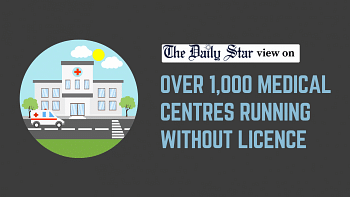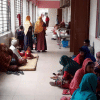Profits must not trump patient care

It is alarming to see the level of adherence to health regulations in private diagnostic centres, clinics, and hospitals as unearthed during a series of raids by health officials on Tuesday. According to a report by this daily, numerous irregularities were uncovered during the raids on over 100 such facilities across the country, leading to the closure of some establishments and warnings issued to others. This has once again brought to light the woeful state of healthcare in Bangladesh, the general disregard for established guidelines in most private facilities, and the pressing need for reform.
It was only the other day that we talked about medical negligence after three anaesthesia-induced deaths in private facilities in Dhaka. The acute shortage of anaesthesiologists or physicians in general is, however, merely the tip of a rather humongous iceberg. The DGHS, which had issued 10 guidelines last Thursday following reports on wrong or negligent treatment, conducted the raids to check compliance, and what emerged is a disturbing picture where profits trump patient care. The picture was almost the same anywhere the raids were conducted, from Dhaka to Chattogram to Pabna to Rajshahi to Chapainawabganj. The anomalies discovered were as varied as they were horrifying: use of expired drugs and reagents, blank pathology reports pre-signed by doctors, improper blood sample collection and preservation, absence of rate charts for tests, lack of certified technicians in diagnostic centres, anomalies in operation theatre management—the list goes on.
At the heart of the problem seems to be the lack of oversight and accountability, emboldening many facilities to ignore government directives, charge exorbitantly high for services, cut corners where they can, and endanger patient safety. While the DGHS punished some establishments during its raids, its own role in ensuring that only licensed and compliant facilities are operational has been questionable, to say the least. According to its own estimate, there are some 1,027 private clinics, hospitals, diagnostic centres and blood banks that do not have a valid licence. If it cannot do the bare minimum of shutting illegal facilities, how can it ensure that the many thousand facilities that are in operation are fully in compliance with the law?
So, while we appreciate the DGHS raids, such initiatives must be a frequent undertaking to ensure sustained compliance from all medical facilities, private or public. Greater efforts must be made to streamline all such regulatory processes, enhance monitoring mechanisms, and promote transparency and accountability across the healthcare system. We must prioritise quality care and patient safety above everything else.


 For all latest news, follow The Daily Star's Google News channel.
For all latest news, follow The Daily Star's Google News channel. 










Comments